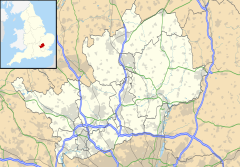Chorleywood Urban District
| Chorleywood | |
|---|---|
| Chorleywood shown within Hertfordshire | |
| Population | 11,286 (2011 Census) |
| OS grid reference | TQ025965 |
| District | |
| Shire county | |
| Region | |
| Country | England |
| Sovereign state | United Kingdom |
| Post town | RICKMANSWORTH |
| Postcode district | WD3 |
| Dialling code |
01923 01927 |
| Police | Hertfordshire |
| Fire | Hertfordshire |
| Ambulance | East of England |
| EU Parliament | East of England |
| UK Parliament | |
Chorleywood is a village and civil parish in Three Rivers District, Hertfordshire. It is situated in the far south-west of Hertfordshire on the border with Buckinghamshire approximately 32 kilometres (20 mi) north-west of Charing Cross. It is part of the London commuter belt and included in the government-defined Greater London Urban Area. Chorleywood as a parish was created in 1845 from part of the parish of Rickmansworth.
The parish had a population of 11,286 people at the 2011 census. In a 2004 survey of neighbourhoods carried out by the Office of the Deputy Prime Minister, Chorleywood was found to be the neighbourhood in England with the highest quality of life. Of the 32,482 neighbourhoods surveyed, Chorleywood came out top using thirty-seven criteria.
Settlement at Chorleywood dates to the Paleolithic era when the plentiful flint supply led to swift development of tools by man. The Romans built a village on the ancient site complete with a mill and brewery.
A large influx of Saxon settlers called it 'Cerola Leah', meaning a meadow in a clearing. Through Chorleywood runs the line that once divided the Kingdoms of Mercia and Wessex and now divides the counties of Hertfordshire and Buckinghamshire. Edward the Confessor gave Chorleywood to the Monastery of St Albans.
By 1278, it was known as 'Bosco de Cherle' or 'Churl's Wood', Norman for 'Peasant's Wood'. Upon the Dissolution of the Monasteries, it passed to the Bishopric of London, being renamed 'Charleywoode'. It became Crown property during the reign of Elizabeth I. The Turnpike Act (1663) gave Chorleywood a chance to exploit its strategic position, allowing locals the opportunity to charge civilians to use the road from Hatfield to Reading.
...
Wikipedia

